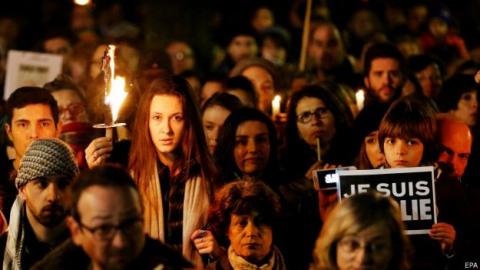Charlie Hebdo and the “Clash of Civilizations”
Echoing Samuel Huntington’s famous warning that “Islam has bloody borders,” Richard Dawkins, the English ethologist and atheist, who wrote the 2006 best-seller “The God Delusion,” wrote on Twitter of the Paris attackers, “They shouted ‘We have avenged the Prophet Muhammad’. . . . Some useful idiot will claim it had nothing to do with religion.” And, subsequently, “No, all religions are NOT equally violent. Some have never been violent, some gave it up centuries ago. One religion conspicuously didn’t.” On the op-ed page of the Wall Street Journal on Thursday, Ayaan Hirsi Ali, the Somali-born writer and activist, wrote, “After the horrific massacre . . . perhaps the West will finally put away its legion of useless tropes trying to deny the relationship between violence and radical Islam.”
On one level, writers like Dawkins and Ali are merely stating the obvious. Of course jihadis, including those involved in the Paris attack, are motivated by a radical reading of Islam: that is what the term “jihadi” connotes. And, as Ali also pointed out in her column, there are some serious, if controversial, Muslim scholars whom the self-styled religious warriors can cite in support of their murderous onslaught. The histories of the fundamentalist Salafi and Wahhabi movements are replete with such figures, and their teachings figure prominently at radical mosques and Web sites. If you ask, as many people did yesterday, why so many terrorist attacks are carried out by Muslims, one of the answers is that some Muslims believe in a version of their creed that justifies, and, indeed, glorifies, violence.
It is one thing to follow Ali’s advice and acknowledge this connection. But, as Nicholas Kristof pointed out in the Times on Thursday, it is a much bigger and more dangerous leap to answer in the affirmative this question: “Is there something about Islam that leads inexorably to violence, terrorism and subjugation of women?” Just hours after the shootings, the Muslim Council of France issued a statement reading, “This extremely grave barbaric action is also an attack against democracy and the freedom of the press.” The Muslim Council of Britain said, “Whomever the attackers are, and whatever the cause may be, nothing justifies the taking of life.” The Arab League condemned the massacre, and Al-Azhar University in Cairo, Sunni Islam’s most prestigious center of learning, called it a “criminal attack,” adding that “Islam denounces any violence.”
Tariq Ramadan, a professor of Islamic studies at Oxford University—who is renowned for rejecting some fundamentalist readings of the Koran and, as a 2005 profile in Foreign Affairs put it, “wants Muslims in the West to see themselves not as an aggrieved minority in hostile territory but as equal members of Western society, with full rights and full responsibilities”—offered a similarly forceful response. On Wednesday, in a statement posted on his Facebook page, Ramadan wrote: “Charlie Hebdo. NO NO! NO! Contrary to what was apparently said by the killers in the bombing of Charlie Hebdo’s headquarters, it is not the Prophet who was avenged, it is our religion, our values and Islamic principles that have been betrayed and tainted. My condemnation is absolute and my anger is profound (healthy and a thousand times justified) against this horror!!!”
At times like this, inevitably, there is a tendency to view things in Manichean terms, and to suppose, as Huntington postulated, that we are engaged in a “Clash of Civilizations,” with us on the one side, and the Muslims—wherever they are—on the other. But to interpret things in such black-and-white terms is to distort reality. Although Islam largely missed out on the Reformation and the Enlightenment, a point frequently made by its critics, it is far from a monolithic religion. And many ordinary Muslims, rather than being on the side of the jihadis, are taking up arms against them, and sometimes paying with their lives. In Iraq, the Iraqi, Kurdish, and Iranian soldiers battling ISIS are mostly Muslims. In Pakistan and Afghanistan, the government forces fighting jihadis are also almost all Muslims.
On top of this, most of the victims of jihadi atrocities are Muslims. In Iraq last month, more than eleven hundred people were killed in acts of terrorism and violence, including nearly seven hundred civilians. It’s fair to assume that almost all of them belonged to the Islamic faith. The hundred and forty-one victims of the terrible Taliban attack on a school in Peshawar, in December, were Muslims. The same is true, to cite a more recent and largely unnoticed example, of the thirty people killed by a suicide bomber in Sana’a, the capital of Yemen, on Tuesday. And, as we now know, one of the French policemen killed outside the Charlie Hebdo offices was a Muslim named Ahmed Merabet, and one of those killed inside the building was a copy editor named Mustapha Ourrad, who was of Algerian descent.
In many ways, the rise of jihad is as much a civil war among Muslims as it is an East–West confrontation: the great divide runs across religions and societies, as well as between them. After an outrage such as the one we have just witnessed in Paris, that can be hard to remember, but it mustn’t be forgotten. John Kerry, in remarks he delivered at the State Department immediately after the attack, struck the right tone. “Today’s murders are part of a larger confrontation, not between civilizations, no, but between civilization itself and those who are opposed to a civilized world,” Kerry said. “The murderers dared proclaim, Charlie Hebdo is dead. But make no mistake, they are wrong.”
John Cassidy

